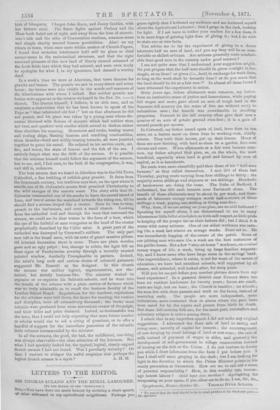LETTERS TO THE EDITOR.
SIR THOMAS ACLAND AND THE RURAL LABOURER. [To Tali EDITOR Or TEM ..SPEOTATOR.1 SIR,—You have done me much honour by noticing a short speech of mine addressed to my agricultural neighbours. Perhaps you
guess rightly that I bothered may audience and am bothered myself about the Agricultural Labourer; that I grope in the dark, looking for light. If I ask leave to bother your readers for a few lines, it is in more hope of gaining light than of giving it ; but I do wish to state one or two facts.
You advise me to try the experiment of giving to a dozen. labourers half an acre of land, and you say they will be as com- fortable as skilled artizans. Are artizans generally more comfort- able than good men in the country under good masters ?
I am not quite sure that I understand your suggestion aright.. Do you propose that the half-acre should be given outright in fee- simple, or on lives ? or given (i.e., lent) in exchange for work done, so long as the work shall be honestly done ? or do you mean that the land should be let at a fair rent VI' In almost all these forms I have witnessed the experiment in action.
Sixty years ago, before allotments were common, my father, from an instinctive sense of justice and benevolence, while paying full wages and more, gave about an acre of rough land in the Somerset hill country (in the sense of free use without rent) to industrious men ; the benefit was considerable in checking pauperism. Farmers in the hill country often give their men a quarter of an acre of potato ground rent-free ; it is a gain of several pounds per annum.
in Cornwall, my father leased spots of land, from four to ten, acres, on a barren moor on three lives to working-men, chiefly miners. They built their houses, put up their fences. Many of them are now thriving, with land as clean as a garden, first-rate' clovers and roots. When allotments at a fair rent became com- mon, my father adopted -that plan, as, on the whole, the most beneficial, especially when laud is good and farmed by men of capital, as it is hereabouts.
No rents were more cheerfully paid than those of hie "half-acme farmers," as they called themselves. I met 200 of them last Thursday, paying rents varying from four shillings to thirty ; the majority seven shillings and sixpence or ten shillings. Hundreds of landowners are doing the same. The Duke of Bedford, I understand, has 800 such tenants near Tavistook alone. The • benefit of these allotments may be about 2s. per week, and thou- sands of labourers occupy cottages worth half-a-crown or three shillings a week, paying one shilling or living rout-free.
Why, then, if we are acting on your plan, arc we still bothered ? Speaking for myself alone, I am disheartened to see in many labourers so little Selbst-slandigkeit, so little self-respect, so little pride • in keeping off the pauper list as their fathers did ; but I think it is worse with many artizans. One of our ablest workmen was earn- ing 18s. a week last winter on sewage works. Frost set in, He, was immediately begging of the curate of the parish. Some of our jobbing men who earn 138. a week are the best customers of the public-house. Not a few "stay-at-home " workmen, on nominaf money wages of 103. a week, bring up large families respecta- bly, and I know some who have large sums in the savings' bank. Our improvidence, where it exists, is not for want of the means of. education ; we have had excellent schools, well supported by all classes, well attended, well looked after, for sixty years.
Will you let me put before you another picture drawn from my.. local experience ? In a pastoral district near Exmoor there has been no resident landowner for twenty years ; farms are small, rents are high, but on lease ; the Church is inactive ; no schools the sons live with their parents and work on the farms, instead of • marrying early. The people are more independent, more industrious, more couteuted than in places where the poor have been cared for by the squire and parson front birth to death. But these hill-country folk are, for the most part, teetotallers and, voluntary religion is active among them.
I admit that in my imperfect speech I did not make any original suggestions. I advocated the freer sale of laud to saving and rising men ; security of capital for tenants ; the encouragenieut of cow-keeping by small lettings of land or cow-runs; the sale of milk instead of payment of wages in cider, and generally the development of self-government in village communities instead of leaning on the rich or the Union. I do not venture to detain you while I draw inferences from the facts I put before you. I fear I shalletill seem groping in the dark ; but I am looking for light in the direction to which the Prime Minister points in his manly peroration at Greenwich. How are we to call out a sense of personal responsibility ? How, in this wealthy age, encour- age honest labour ? Quid leges sine moribus Apologizing for trespassing on your space, if you allow me to do so, I am, Sir, 840.,,, ,S)wydoneote, Exeter, October 31. Tlloara.s DYKE ACLAND.
We meant that the land should be let In retail patches at the wholesale price:— ED. Spaceator.


































 Previous page
Previous page